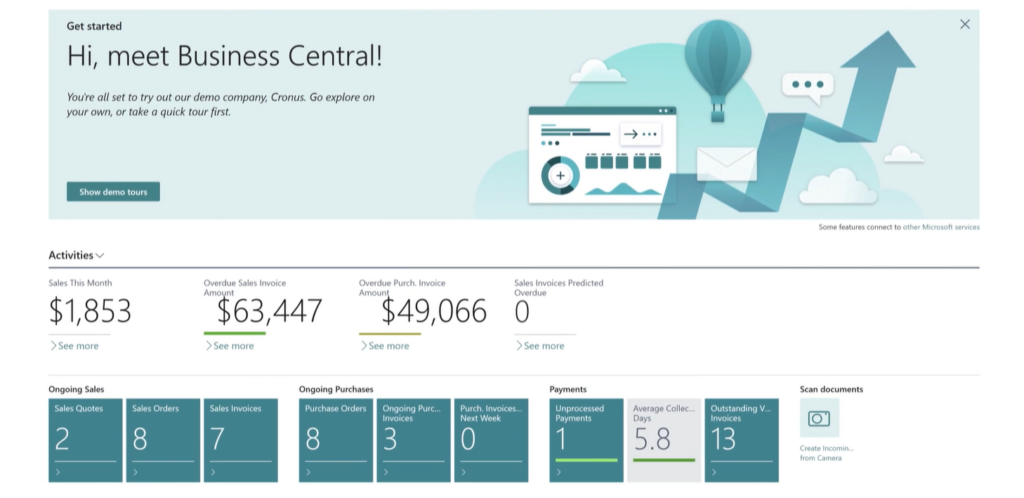Businesses today are spoiled for choice when it comes to software. From cloud-based Enterprise Resource Planning (ERP software) to AI-powered process automation, the options seem endless — and that can make selecting the right one overwhelming. Add to that the high cost of implementation, and the risks of making the wrong decision become even more significant. In fact, recent studies show that nearly 60% of ERP implementations exceed budget, while over 50% fail to deliver expected business benefits within the first year. With stakes this high, your business needs to make the proper decision to avoid costly setbacks.
Here are some of the most common pitfalls companies fall into when selecting ERP software — and our expert tips on how to avoid them:
1. Overvaluing Brand Names
It’s easy to assume that a well-known software provider guarantees a flawless solution, but that’s rarely the case. While big names like Dynamics 365 Business Central, Sage, or QuickBooks may offer credibility, the key is to assess how well their ERP software aligns with your business’s unique needs. Today’s ERP systems are often modular and customizable, so the right fit depends on whether the software can support your operational goals and solve specific challenges for accounting, finance, operations, inventory, and more.
Tip: Start by identifying pain points and creating a list of must-have features. Then, assess each software solution against this list.

2. Leaving the Selection to One Department
While ERP implementation often falls on IT, it’s important for leadership and department heads to be involved in the decision-making process. ERP software impact every part of an organization — from finance and HR to supply chain and customer service. Relying solely on IT to make the decision overlooks the broader picture.
Gathering input from other departments that are impacted by the new ERP software will ensure complete buy-in from all stakeholders, and guarantee that users are getting the features they need to be productive.
Tip: Form a cross-departmental team to evaluate solutions and ensure every stakeholder’s needs are considered.
3. Focusing Solely on Cost
ERP implementation can be expensive, but going with the cheapest option often results in higher long-term costs. And choosing the most expensive one can also lead to costly implementation budget overruns and a system that is underutilized. Choosing ERP software that meets your business requirements will deliver a better return on investment through increased efficiency, scalability, and real-time data insights.
Tip: Focus on total cost of ownership over the software’s lifespan, including upgrades, integrations, and maintenance.
4. Withholding Information from Vendors
Transparency with vendors is essential when selecting ERP software. ERP systems can integrate AI, machine learning, and real-time analytics, making them highly adaptable to specific business needs. Sharing detailed operational requirements allows vendors to offer accurate solutions that can be customized, rather than overestimating costs due to unknowns.
Sharing your current processes (good or bad) will help your ERP implementation partner design a solution that fixes the bad and makes the good better.
Tip: Provide detailed information about your business operations to ensure the solution is tailored to your needs.
5. Being Swayed by a Demo
While demos are helpful, they only provide a surface-level view of how the software functions. While many of today’s ERP solutions feature AI-driven automation and real-time analytics, how these features will benefit your specific business processes is best assessed through hands-on testing or pilot projects.
Look for partners that can provide details on how the new ERP can specifically do the function you are looking for.
Tip: Request a sandbox environment to test the software in real-world scenarios before making a final decision.
6. Failing to Collect Current References
Collecting references remains a must – specifically industry-specific references that align with your business size and operational model. Real-world feedback on how the ERP handles integrations, security, and scalability are invaluable.
Beyond software references, you also want to make sure your implementation partner is capable and well regarded. Look for positive reviews and experience of your ERP partner as well.
Tip: Request references from companies of a similar size, industry, and complexity to get a realistic understanding of how the ERP will perform for you.
By avoiding these common pitfalls, businesses can better navigate the crowded ERP market and make informed decisions that support long-term success.
Our Approach to ERP Software Selection Lies in Simplicity
The 360 Visibility team consists of implementation specialists who can assess the complexities of Enterprise Resource Planning systems. Through our Business Impact Assessment, we take the guesswork out of your critical business decisions and collaborate with your team to tailor solutions that meet your needs. Our ultimate goal is to drive cost savings while maximizing the value of your ERP investment.
Don’t let uncertainty hinder your organization’s growth. Let’s make the right choice – together.



